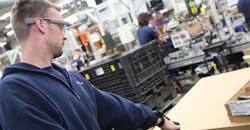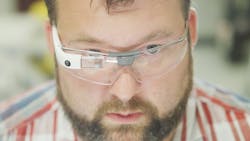Tech Notes: Google Glass Returns, This Time With Industrial Tweaks
Tech Notes is a weekly collection of news, notes, facts, figures, short stories, blurbs and more about the manufacturing tech world. Have something you think should be shared? Send an email to [email protected] or tweet @MattLaWell.
Google Glass is back and better than ever — even though, for many on the factory floor, it never really disappeared in the first place.
Google formally announced the Enterprise Edition of its often-maligned smartglasses on Tuesday — Wired reported the news with a breathless 3,845-word feature story — and the news spread almost instantly. The general public expressed more than a little surprise, but not those here in the industrial space — and certainly not regular readers of IndustryWeek. (A July 2015 story about “Google Glass for the Shop Floor” outlined how Michigan manufacturer Fisher Dynamics had worked with Plex Systems to develop practical uses for Glass.)
Major companies like GE, Boeing and Volkswagen have incorporated the Enterprise Edition into their manufacturing processes since early 2015, but were contractually obligated to not discuss the new version. The Enterprise Edition is better suited for those who wear prescription lenses, even offering OSHA-certified safety shields. The product’s networking is faster, its Wi-Fi is more reliable, its battery life is longer, its camera is improved (and actually provides visual indication when it’s in use), and it’s more secure.
“It looks very similar to original Glass but improves on every aspect of it,” Upskill CEO Brian Ballard told Wired. “They had seen how we were using it, and rethought everything — how you charge it, fold it up, prevent sweating, Wi-Fi coverage. … For our market we desperately needed a product with a brand like Google behind it.
“Our customers don’t buy things from Kickstarter.”
According to a 2016 report from Forrester Research, more than 14 million American workers will be wearing smartglasses on the job within the next eight years — despite the number of wearable manufacturers dropping from about 320 in 2013 to about 110 this year — and the real fun will be seeing how smaller manufacturers use the tech. It has improved so much since Fisher Dynamics used it first to scan bar codes and pull up video instructions just two years ago.
Do you plan to use the new Enterprise Edition on your floor? Have you been using it and can finally discuss it publicly? Let me know. Send me an email. Tweet at me. I want to hear your stories and share them on IW.
ROBOTICS BREAKS DOWN BORDERS: Students from 157 countries poured into Washington, D.C., this week for the FIRST Global Robotics competition, and while the teams from Afghanistan and Burundi grabbed most of the attention (the Afghan girls for being denied visas then being expedited by Donald Trump, the Burundis for disappearing, perhaps in a planned effort to defect from their home country), the 155 other teams were pretty noteworthy, too.
“If we can get kids from around the world to deal with the same issues … we could compete on the same team,” FIRST Global founder and Segway inventor Dean Kamen said in an interview with The Washington Post. “You don’t have to have self-inflicted wounds created by arbitrary differences and politics.”
The biggest takeaway wasn’t who won what (the event was far more cooperative than competitive). No, it was the surprising alliances formed by different teams. Iran and Israel. Turkey and Armenia. Borders and hostilities disappearing. It was heartening, and wonderful — and maybe Kamen’s greatest contribution.
ONE POTENTIAL EFFECT OF AI: Naysayers, doom-and-gloomers and, some would say, realists have preached for years how artificial intelligence will grab our jobs and render us obsolete. Count Charles Fadel among that group.
Fadel is the founder and chairman of the Center for Curriculum Redesign and focuses on developing “innovative ways to revamp education systems to make learning more relevant” for the modern world. In a recent interview with future-focused CMRubinWorld he claimed that almost two of every five jobs will be eliminated by AI by 2032.
“A higher level of overall expertise is needed to be able to survive in this new environment,” Fadel said. “As it became the norm during the Industrial Revolution, the Digital Revolution is placing an even greater pressure on all of us. People need to be versatile and adaptable to their morphing environments, and to be ‘upskilled.’ This is similar to what was implemented for the Industrial Revolution but with the rapid growth of automation, this process needs to be implemented significantly faster.” Education needs to become more relevant, versatile and actionable, he said. Sounds about right.
Holleran talked with IW for a new Manufacturing Leader of the Week feature, and he makes some great points. If you haven’t read it yet, maybe tack it onto your weekend reading list.
About the Author
Matt LaWell
Staff Writer
Staff writer Matt LaWell explores news in manufacturing technology, covering the trends and developments in automation, robotics, digital tools and emerging technologies. He also reports on the best practices of the most successful high tech companies, including computer, electronics, and industrial machinery and equipment manufacturers.
Matt joined IndustryWeek in 2015 after six years at newspapers and magazines in West Virginia, North Carolina and Ohio, a season on the road with his wife writing about America and minor league baseball, and three years running a small business. He received his bachelor's degree in magazine journalism from Ohio University.



